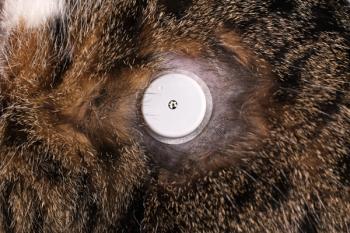
insulin choices for small animals (Proceedings)
Pathogenesis: Insulin-dependent, non-insulin dependent, and transient
Pathogenesis
- Insulin-dependent
- Non-insulin dependent
- Transient
Diagnosis
- Clinical signs
- Persistent hyperglycemia
- Glucosuria
- Stress-related hyperglycemia
- Insulin-dependent versus non-insulin dependent
- difficult to separate
- often diagnosed by clinical presentation or in retrospect
Patient evaluation
- Stable versus non stable
- ketotic
- acidotic
- hyperosmolar
- hydration status
- eating/drinking
- Concurrent disease
- urinary tract infection
- concurrent endocrinopathies: cushing's disease, hypothyroidism, hyperthyroidism
- pancreatitis
- infections
- pregnancy
- reproductively intact
- Testing
- CBC
- Chemistry
- Urinalysis
- ketonuria
- bacteriuria
- pyuria
- Urine culture
- abdominal ultrasound
- pancreatic lipase immunoreactivity (PLI)
- insulin-dependent versus non-insulin dependent – no good way to differentiate
- Treatment for the stable animal
- ketotic versus non ketotic
- hospitalization versus non hospitalization
- Goals of therapy
- correction of clinical signs
- control of concurrent disease
- avoidance of emergency situations
- hypoglycemia
- ketosis/ketoacidosis
- hyperosmolality
- Treatment for the stable feline diabetic
- diet – low carbohydrate
- diet + insulin
- effects very variable
- intermediate-acting; bid
- 0.25 U/kg; 1-2 U/cat bid
- Treatment for the stable canine diabetic
- diet + insulin
- high insoluble fiber diet; calorie restriction
- intermediate-acting insulin;
- 0.5 U/kg bid
- Feed bid with insulin
- Exercise
- Identification and control of concurrent disease
- Time for initial control: 4-6 weeks
- Oral hypoglycemic agents – may worsen disease, especially in cats
- chromium and vanadium
- trace minerals
- insulin sensitizers
- ineffective in dogs
- metformin (biguanide) – not effective in diabetic cats as a sole agent
- glipizide, gyburide (sulfonylurea)
- stimulate insulin secretion
- NIDDM
- worsening of islet cell amyloidosis
- Alpha-glucosidase Inhibitors
- acarbose
- miglitol
- complex oligosaccharides that inhibit enzymes in the brush border of the small intestine responsible for digestion of carbsin diabetic dogs: acarbose decreased dose of insulin necessary
- diarrhea
- weight loss
- 12.5-25 mg/dog at meal time
Insulin choices
type
Source
Conc
Route
Onset
Duration(d)
Duration©
regular
Human recom
100U/ml
IV
immed
1-2 h
1-2 h
IM
10-30 min
2-6
2-6
SC
30-60 min
2-6
2-6
NPH
Human recom
100 U/ml
SC
0.5-2 h
4-12
4-6
Lente (VetsulinTM)
Pork
40 U/ml
SC
0.5-2 h
6-16
4-16*
PZI
Beef/Pork
40 U/ml
SC
0.5-4 h
6-16
6-16**
PZI (Pro ZincTM)
Human
Recom
40 U/ml
SC
0.5-4 h
6-16
6-16
Glargine
LantusTM
Human mutated
100 U/ml
SC
0.5-1 h
6-16
6-16
Detemir
LevemirTM
Human
mutated
100 U/ml
SC
0.5-1 hr
6-16
6-16
Lispro -HumalogTM
Aspart -NovoLogTM
Human mutated
100 U/L
SC
15 min
2-6 hrs.
2-6 hrs
Short/intermediate acting mixtures
50/50
70/30
75/25
Mixtures of insulins
- *Temporarily unavailable due to manufacturing concerns
** No longer available by IDEXX. Some compounding pharmacies are selling their own compounds
Newsletter
From exam room tips to practice management insights, get trusted veterinary news delivered straight to your inbox—subscribe to dvm360.




